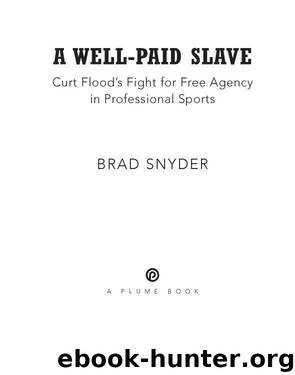A Well-Paid Slave by Brad Snyder

Author:Brad Snyder
Language: eng
Format: epub
Publisher: Penguin Group US
The [NBA’s] college player draft binds the player to the team selected. Basketball, however, does not enjoy exemption from the antitrust laws. Thus the decision in this suit would be similar to the one on baseball’s reserve clause which our decisions exempting baseball have foreclosed. This group boycott issue in professional sports is a significant one.
Douglas deemed the reserve clause and the NBA draft “group boycotts,” which were considered automatic violations of the antitrust laws, because other employers were refusing to negotiate for the athletes’ services.
For William O. Douglas, the work of a Supreme Court justice was a four-day-a-week job. He often drafted dissenting opinions while sitting on the bench during oral argument. In his spare time, he wrote dozens of books to augment his salary after three divorces had destroyed him financially. He was 67 when he married his fourth wife, a 22-year-old college student. A Columbia law graduate and a corporate law professor at Columbia and Yale, Douglas made a name for himself during the New Deal, cleaning up Wall Street as Roosevelt’s Securities and Exchange Commission chairman. Roosevelt rewarded Douglas in 1939 by nominating him to the Court. Douglas expected Roosevelt to tap him as his next vice president in 1944 instead of Truman. That call never came. He accepted life as a Supreme Court justice as a consolation prize for failing to become president of the United States. Douglas served longer, 36 years, and wrote more opinions than any other justice in the Court’s history.
Douglas stood out as the Court’s liberal loose cannon and resident demonic genius. He lived his libertarian ideals. An avid hiker and outdoorsman, he holed himself up in his mountain cabin in Goose Prairie, Washington, until just before the term began and usually returned there before the term ended. There were no phones at his hideaway. The only way to contact him was by mail or at the nearest phone in town. When the Court was not in session, he relied on his law clerks to send him their cert memos and to relay his thoughts to the Court.
On September 23, 1971, one of Douglas’s law clerks, Kenneth R. Reed, wrote a one-page, single-spaced typewritten memo to the justice. A recent University of Arizona law graduate, Reed typified the law clerks whom Douglas selected from western law schools to counteract what he perceived to be an East Coast, Ivy League bias among the clerks. Reed’s cert memo summarized the history and arguments in Flood’s case in six paragraphs of judicial shorthand. The memo’s conclusion was telling: “Your dissent of the denial of cert last Term in Salerno v. Kuhn would indicate GRANT & DISSENT FROM DENIAL.” Based on Salerno, Reed understood that Douglas was going to vote to grant Flood’s cert petition but that three other votes were not likely to be forthcoming.
Douglas received Reed’s memo in Goose Prairie. On September 27, Reed wrote a short letter to Chief Justice Burger on Douglas’s behalf. Reed included Flood v. Kuhn among a handful
Download
This site does not store any files on its server. We only index and link to content provided by other sites. Please contact the content providers to delete copyright contents if any and email us, we'll remove relevant links or contents immediately.
Machine Learning at Scale with H2O by Gregory Keys | David Whiting(4313)
Never by Ken Follett(3957)
Liar's Poker by Michael Lewis(3450)
The Ultimate Backcountry Survival Manual by Aram Von Benedikt; Editors of Outdoor Life;(3266)
Will by Will Smith(2920)
The Partner by John Grisham(2398)
Can't Hurt Me: Master Your Mind and Defy the Odds - Clean Edition by David Goggins(2342)
Friends, Lovers, and the Big Terrible Thing by Matthew Perry(2230)
Taste by Kris Bryant(1866)
A Short History of War by Jeremy Black(1848)
HBR's 10 Must Reads 2022 by Harvard Business Review(1845)
A Game of Thrones (The Illustrated Edition) by George R. R. Martin(1746)
Never Finished: Unshackle Your Mind and Win the War Within by David Goggins(1714)
515945210 by Unknown(1667)
Why We Love Baseball by Joe Posnanski(1662)
The Arm by Jeff Passan(1614)
443319537 by Unknown(1560)
The Dodgers by Schiavone Michael;(1533)
The Yogi Book by Yogi Berra(1527)
